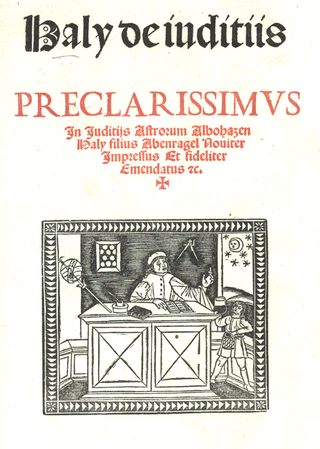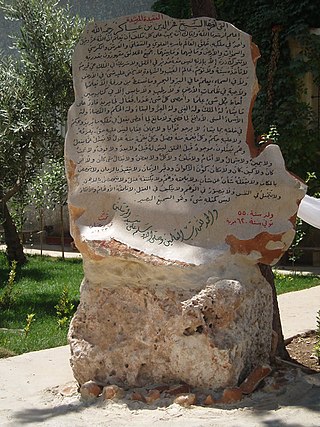Related Research Articles
Māriyya bint Shamʿūn, better known as Māriyyah al-Qibṭiyyah or al-Qubṭiyya, or Maria the Copt, died 637, was an Egyptian woman who, along with her sister Sirin bint Shamun, was given to the Islamic prophet Muhammad in 628 by Al-Muqawqis, a Christian governor of Alexandria, during the territory's Sasanian occupation as slaves. She spent the rest of her life in Medina and had a son, Ibrahim with Muhammad. The son died as an infant and she died almost five years later.
Abū ʿAbdullāh Muḥammad ibn Aḥmad ibn Abī Bakr al-Anṣārī al-Qurṭubī was an Andalusian Sunni Muslim polymath, Maliki jurisconsult, mufassir, muhaddith and an expert in the Arabic language. He was taught by prominent scholars of Córdoba, Spain and he is well known for his classical commentary of the Quran named Tafsir al-Qurtubi.

Abū l-Ḥasan 'Alī ibn Abī l-Rijāl al-Shaybani was an Arab astrologer of the 10th to 11th century CE / 4th to 5th century AH best known for his Kitāb al-bāri' fī aḥkām an-nujūm.
Abū’l-Ḥasan ʻAlī ibn Ismāʻīl, known as Ibn Sīdah, or Ibn Sīdah'l-Mursī, (c.1007-1066), was a linguist, philologist and lexicographer of Classical Arabic from Andalusia. He compiled the encyclopedia al-Kitāb al-Mukhaṣṣaṣ (المخصص) and the Arabic language dictionary Al-Muḥkam wa-al-muḥīt al-aʻẓam (The Great and Comprehensive Arbiter". His contributions to the sciences of language, literature and logic were considerable.

Ze’ev Maghen is an Israeli scholar. He is a professor of Arabic and Islamic history and chairman of the Department of Middle East Studies at Bar-Ilan University. Maghen is also a senior fellow at the Begin-Sadat Institute for Strategic Studies, as well as the founder of the Middle East and Islamic Studies program at Shalem College in Jerusalem.

Abu al-Walid al-Baji, full name Sulayman ibn Khalaf ibn Saʿdibn Ayyub al-Qadi Abu al-Walid al-Tujaybi al-Andalusi al-Qurtubi al-Baji al-Tamimi al-Dhahabi al-Maliki, was a Sunni scholar from Beja in al-Andalus. He was an eminent Mālikī jurist (faqih), hadith master (muhaddith), theologian (mutakallim), poet and a man of letters. He was an accomplished debater, prolific writer in numerous scientific works and was a meticulous scholar whose high calibre of knowledge and religious merit are widely acknowledged. He and Ibn Ḥazm were "the two most important literary figures in eleventh-century al-Andalus".
Ibn al-Qūṭiyya, born Muḥammad Ibn ʿUmar Ibn ʿAbd al-ʿAzīz ibn ʾIbrāhīm ibn ʿIsā ibn Muzāḥim, also known as Abu Bakr or al-Qurtubi, was an Andalusian historian and considered the greatest philologist at the Umayyad court of caliph Al-Hakam II. His magnum opus, the History of the Conquest of al-Andalus, is one of the earliest Arabic Muslim accounts of the Islamic conquest of Spain.
Jamāl al-Dīn Abū al-Ḥasan 'Alī ibn Yūsuf ibn Ibrāhīm ibn 'Abd al-Wahid al-Shaybānī, called 'al-Qifṭī, was an Egyptian Arab historian, biographer, encyclopedist and administrator under the Ayyubid rulers of Aleppo. His biographical dictionary Kitāb Ikhbār al-'Ulamā' bi Akhbār al-Ḥukamā is an important source of Islamic biography. Much of his vast literary output is lost, including his histories of the Seljuks, Buyids and the Maghreb, and biographical dictionaries of philosophers and philologists.
Abd al-Qadir ibn Ali ibn Yusuf al-Fasi or SidiAbdelkader el-Fassi or, in full, Abu Mohammed, Abu Sa'ud Abd al-Qadir al-Fasi ibn Abu al-Hasan Ali ibn Abu al-Mahasin Yusuf al-Qasri al-Fasi was the founder of the Shadhili zawiyya of Ksar-el-Kebir. His biography, Tuhfat al-Kebir, was written by his son Abd al-Rahman al-Fasi. He was one of the most prominent members of the al-Fasi family.
Mohammed al-Mahdi al-Fasi also known as Abu Isa Abu Abdallah Mohammed al-Mahdi ibn Ahmad ibn Ali ibn Yusuf al-Fihri al-Fasi was a well-known mystic, biographer and historian from Fes. A member of the prominent al-Fasi family. He was born in Ksar al-Kebir on May 17, 1624 and died 20 February 1698. He was buried in the mausoleum of his great grandfather Abu l-Mahasin Yusuf al-Fasi.

Ibn Ḥajar al-ʿAsqalānī, or simply ibn Ḥajar, was a classic Islamic scholar "whose life work constitutes the final summation of the science of hadith." He authored some 150 works on hadith, history, biography, exegesis, poetry, and the Shafi'i school of jurisprudence, the most valued of which being his commentary of Sahih al-Bukhari, titled Fath al-Bari. He is known by the honorific epithets Hafiz al-Asr "Hafiz of the Time", Shaykh al-Islam "Shaykh of Islam", and Amir al-Mu'minin fi al-Hadith "Leader of the Believers in Hadith".
Abu Yahya ibn al-Sakkak al-Miknasi, was a Moroccan historian, genealogist, judge, Maliki scholar and Sufi mystic. He was born in Fez into the Ibn al-Sakkak family, a Berber family from the Miknasa tribe. He was a friend of Ibn Khaldun, they both studied under al-Sharif al-Tilimsani. al-Sakkak was especially well known as author of an advice to Muslim kings, Nush muluk al-islam bi-al-tarif bi-ma yajibu alay-him min huquq ila bayt al-kiram. In his advice Ibn Sakkak expressed skepticism about the divine right claimed by some rulers in his time.
Abu Bakr al-Khassaf was a Hanafite law scholar at the court of the 14th Abbasid Caliph al-Muhtadi.
Abū Muḥammad al-Ḥasan b Mūsā an-Nawbakhtī was a Persian and leading Shī'ī theologian and philosopher in the first half of the 10th century. The Nawbakhtī family boasted a number of scholars famous at the Abbāsid court of Hārūn al-Rashīd. Al-Ḥasan ibn Mūsa is best known for his book about the Shi'a sects titled Firaq al-Shi'a.
Abū Isḥāq Ibrāhīm ibn Muḥammad ibn al-Sarī al-Zajjāj was a grammarian of Basrah, a scholar of philology and theology and a favourite at the Abbāsid court. He died in 922 at Baghdād, the capital city in his time.
Abū Bakr az-Zubaydī, also known as Muḥammad ibn al-Ḥasan ibn ‘Abd Allāh ibn Madḥīj al-Faqīh and Muḥammad ibn al-Ḥasan az-Zubaydī al-Ishbīlī, held the title Akhbār al-fuquhā and wrote books on topics including philology, biography, history, philosophy, law, lexicology, and hadith.
Hubayrah ibn Sabal ibn al-‘Ajlān al-Thaqafī was a companion of the Islamic prophet Muhammad. It is narrated that he was the first person Muhammad ordered to lead prayers in Mecca after its conquest in 8 AH (630). It is also narrated that when Muhammad departed for Ta'if that year, he left Hubayrah in charge of Mecca. Then, after he returned from Ta'if and prepared to depart for Medina, he appointed Attab ibn Asid as governor. Al-Dhahabi writes about Hubayrah, "He governed Mecca before Attab ibn Asid for a few days."
References
- ↑ Eric Chaumont, "La notion de 'awra selon abu l-hasan 'alî b. muhammad b. al-qattân al-fâsî (m. 628/1231)" (trl. The concept of 'awra according to abû l-hasan 'all b. muhammad al-qattan al-fasi (d. 628/1231), in: Revue du monde musulman et de la Méditerranée, 2006, no113-14, pp. 109-123 (Le corps et le sacré en Orient musulman)
- ↑ ed. 1996 in Beyrouth-Casablanca ref. in: Maghen, Ze'ev, "See No Evil: Morality and Methodology in Ibn Al-qattan al-Fasi's Ahkam al-nazar bi-Hassat al-Basar" in: Islamic Law and Society, Vol. 14, No. 3. (2007), pp. 342-390
- ↑ ed. al-Huasayn Ayat Said, 5 vols (Riad: Dar al-Tayba, 1997 ref. in:Jonathan A. C. Brown, The canonization of al-Bukhārī, BRILL, 2007, passim
